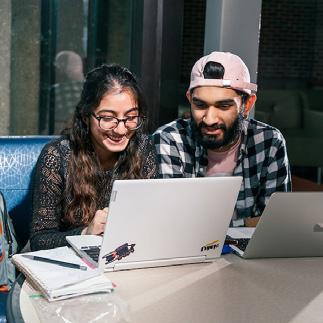
4 minute read
UIC Academic Resources
Library
The Richard J. Daley Library has books and electronic materials, computers, printers and more for study in the arts, humanities, social sciences, sciences and engineering. Librarians can help students find information for classes and meet with them about research papers and projects. Many resources are also located on the Richard J. Daley Library website and are available 24/7. The IDEA Commons is a state-of-the-art, collaborative learning environment with technology and research materials as well as a café! The IDEA Commons is a suitable area for individual and group study, tutoring, and reference consultations and research. Hours, programs, services, and access to group study spaces may be subject to change in accordance with public health and University safety guidelines. 312-996-2724 | library.uic.edu
Honors College
The Honors College is a community of students seeking extra intellectual academic challenges, campus engagement, and leadership experiences. All UIC students can apply to be in the Honors College as long as their UIC cumulative GPA is a 3.4/4.0 and they have at least four semesters left before graduation. After their first year, all Honors College students are assigned a Faculty Fellow within their field of study. They will meet at least once per semester to review academic progress and decide on an honors activity. The Fellow acts as a mentor and offers academic advice to the student. In addition to a Faculty Fellow, Honors College students also have an assigned Honors Advisor who helps track the overall progress of the student throughout their time at UIC. hcollege@uic.edu | honors.uic.edu
Undergraduate Research
As a research-intensive university, UIC offers a variety of opportunities for undergraduate students to engage in significant exploratory endeavors. Opportunities are available to all students in many fields. There are undergraduate research opportunities available in virtually every department. The Student Research Forum showcases independent research conducted by undergraduate students. Students from all disciplines (arts, business, computer science, engineering, humanities, life sciences, mathematics, physical sciences, social sciences, among others) are invited to present their work one-on-one to Forum attendees and judges during a high-energy 3-hour session, followed by an awards ceremony. Monetary awards will be given in various categories. A poster or visual display that highlights key features of the project accompanies research presentations. 312-996-4995 | research.uic.edu
Summer Session
Taking summer courses can be part of a student’s strategy to stay on track, catch up, or even get ahead. UIC’s Summer Session offers students the flexibility and options they need to combine studies with jobs and travel. UIC has a broad summer course selection—over 250 courses in 50+ subject areas. UIC also offers two summer sessions: an intensive four-week session in May, followed by an eight-week session. Courses in either session are equivalent to a full semester, and students can take one session or both. 312-996-9099 | summer.uic.edu
Study Abroad
The UIC Study Abroad office is committed to making international study an integral part of the UIC degree plan. Study abroad can greatly enhance your student’s UIC experience. It plays a formative role in defining and complementing a student’s academic and professional goals through interdisciplinary coursework, internship placements, research opportunities, and engagement with the global community. Simultaneously, students have a new environment in which to explore their identities, reflect personally, and interact with diverse perspectives. All credit earned abroad will be articulated as UIC credit in order to help students stay on track towards graduation. Study abroad is an investment in students’ education. Institutional and federal financial aid may be applied, and there are a wide range of scholarships available. Students who study abroad are able to gain important career skill sets allowing them to be a more competitive applicant in the job market. Students may participate in a short-term or long-term experience during summer, fall, or spring term by selecting from more than 200 programs in over 50 countries on six continents. The Study Abroad Office has risk management processes and resources in place to support UIC students while they are abroad, including a required comprehensive international health insurance plan and 24/7 emergency support. We look forward to supporting your student in their pursuit of studying abroad! 312-413-7662 | studyabroad.uic.edu
Office of External Fellowships
The Office of External Fellowships (OEF) assists current UIC undergraduate and professional students in searching and applying for nationally competitive scholarships, fellowships, and external awards. They provide information about nationally competitive awards, advice on application preparation, and assistance throughout the application process. OEF does not simply provide a list of opportunities; they help students present themselves clearly and effectively for those that best suit their interests and goals. Students are welcome at any point in their degree program and are encouraged to plan ahead to prepare the strongest possible fellowship applications with assistance from the office. oef@uic.edu | oef.uic.edu
Additional Academic Campus Resources
UIC offers tutoring opportunities for students. There are a number of centers devoted to a specific area of study, as well as general tutoring facilities.
These include:
Ġ The Writing Center Ġ The Math and Science
Learning Center (MSLC) Ġ Honors College Tutoring
Also available are Academic Support Programs:
Ġ Academic Center for Excellence (ACE) Ġ African American Academic
Network (AAAN) Ġ Asian American Resource and Cultural Center (AARCC) Ġ CHANCE Program Ġ Latin American Recruitment and Educational Services (LARES) Ġ Native American Support
Program (NASP)
These are only some of the tutoring resources available to students; they also have the option of going to their professors’ office hours or forming their own study groups.










